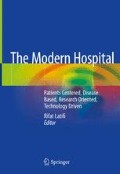Abstract
Resident education in modern hospitals has evolved. Today, residents have access to the entire medical literature, patient data, and decision-making algorithms in the palm of their hand. Modern hospitals change educational paradigms to better train residents based on their individual learning style. These hospitals also balance innovation and patient experience with the fiscal restrains of modern healthcare.
Hospitals often struggle with balancing training of residents with patient safety. This challenge is most pronounced in the operating room where surgical innovation and resident competency are often at odds with one another. As innovation continues to outpace education, teaching faculty are often learners that require practice themselves. This balance is the key to successful training of residents and safe patient care.
Today, resident training requires significant time commitments that most physicians cannot accommodate without financial repercussions. Identifying educational moments and providing real-time feedback offer residents quality educational opportunities in short periods. Furthermore, by training faculty on how to use these moments, residents are able to develop a better mentor/mentee relationship.
Residents cope with high levels of stress and often suffer from burnout later in their career. Physician wellness, mindfulness, and resiliency are key components to combating the negative effects of stress. Finally, multidisciplinary team learning also reduces stress while increasing efficiency and comradery among healthcare professionals. The modern hospital not only provides innovative healthcare to patients but also attempts to prevent burnout among its employees.
Eighty percent of all medical errors and over 2000 preventable deaths per year are due to failures in communication. Modern training programs focus on effective communication among all members of the healthcare team. The well-trained physician is not only capable of effective communication with patients and other medical staff but also is efficient. What was once learned through practice and failure is now a key element to the culture of safety in all hospitals.
Finally, residents require training and development outside of the medical field. Modern hospitals are the most fertile ground to train physicians in leadership and healthcare finance. Residents today are interested in the complex healthcare market and the fiscal effects of healthcare delivery. They also want to understand how they can have financial success throughout their career.
In this chapter, we outline the new training paradigms that create a fruitful culture of learning while addressing resident issues. The goal of any successful training program is to develop the physician workforce for the future while encouraging residents to develop resiliency and work/life balance. While the needs of learners continue to change, we hope to identify some of the emerging issues that residents must cope with today.
Access this chapter
Tax calculation will be finalised at checkout
Purchases are for personal use only
References
Apollo 11: The computers that put man on the moon. ComputerWeekly.com. July 2009. Retrieved from: www.computerweekly.com/feature/Apollo-11-The-computers-that-put-man-on-the-moon
Steenhuysen J. Counting the costs: U.S. hospitals feeling the pain of physician burnout. November 21, 2017. Reuters.com. Retrieved from: https://www.reuters.com/article/us-usa-healthcare-burnout/counting-the-costs-u-s-hospitals-feeling-the-pain-of-physician-burnout-idUSKBN1DL0EX
Agency for Healthcare Research and Quality (AHRQ). Evidence-based decisionmaking. Retrieved from: http://www.ahrq.gov/professionals/prevention-chronic-care/decision/index.html
Reason J. Human error: models and management. BMJ. 2000;320:768.
Sirriyeh R, Lawton R, Gardner P, et al. Coping with medical error: a systematic review of papers to assess the effects of involvement in medical errors on healthcare professionals’ psychological well-being. Qual Saf Health Care. 2010;19:e43.
Brown RL, Holmes H. The use of a factor-analytic procedure for assessing the validity of an employee safety climate model. Accid Anal Prev. 1986;18(6):455–70.
Gill G, Shergill G. Perceptions of safety management and safety culture in the aviation industry in New Zealand. J Air Transp Manag. 2004;10:233–9.
Mintz LJ, Stoller JK. A systematic review of physician leadership and emotional intelligence. J Grad Med Educ. 2014;6(1):21–31.
Taylor S. Presidential address. Southern Surgical Society; 2015.
Author information
Authors and Affiliations
Corresponding author
Editor information
Editors and Affiliations
Rights and permissions
Copyright information
© 2019 Springer Nature Switzerland AG
About this chapter
Cite this chapter
Joseph, S., Joseph, A., Forrest, L.S., Wey, J.S., Eisen, A.M. (2019). Modern Hospital as Training Grounds Dealing with Resident Issues in New Era. In: Latifi, R. (eds) The Modern Hospital. Springer, Cham. https://doi.org/10.1007/978-3-030-01394-3_18
Download citation
DOI: https://doi.org/10.1007/978-3-030-01394-3_18
Publisher Name: Springer, Cham
Print ISBN: 978-3-030-01393-6
Online ISBN: 978-3-030-01394-3
eBook Packages: MedicineMedicine (R0)

